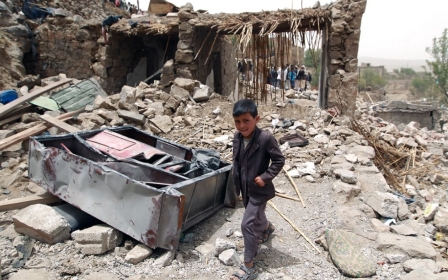Oman evacuates three Americans from Houthi-controlled Sanaa

Oman's air force has evacuated three US citizens from war-torn Yemen to the Omani capital following a request for aid from Washington, the foreign ministry said Thursday.
Oman "coordinated with Yemeni authorities to find them (the Americans) and allow them to leave" late on Wednesday from the airport in Yemen's Houthi-controlled capital Sanaa, said a ministry statement carried by state news agency ONA.
A security official in Sanaa said the three were held by the Houthi-controlled intelligence agency "over spying accusations," adding that they were arrested at different times, with some being in custody for at least five months.
The Omani statement did not identify the Americans.
It said the trio were in Muscat "before heading home", but provided no timeline.
One of two Americans detained in October by the Iran-backed Houthi militia was announced dead in custody by US officials earlier this month. The United Nations said at the time that two foreign personnel working on maintaining a building used by UN staff were detained.
Neighbouring Oman has kept out of a Saudi-led military campaign waged against the militia since March in support of President Abd Rabbuh Mansour Hadi, who had been exiled in Riyadh until his return to Aden on Tuesday.
It has provided both a neutral talks venue and a key mediating role in Yemen, brokering several releases of prisoners or hostages.
In September, Oman secured the release of two other Americans, three Saudis and a Briton held by Houthi militia.
An American journalist believed to have been held by the militia was handed over to Oman in early June along with a Singaporean.
Omani mediation also led to the release of French hostage Isabelle Prime in August after six months in captivity.
10 killed in fighting for key Taiz
Yemeni pro-government forces advancing into the strategic province of Taiz were battling Houthi militia on the outskirts of its second largest town on Thursday, military sources said.
Eight Houthi militiamen and two loyalists were killed in the fighting for Rahida, the pro-government sources said.
The town lies on the main road from government-held territory towards Taiz, Yemen's third largest city, 40 kilometres further north, where loyalist troops have been besieged by the rebels for months.
Pro-Hadi forces were backed by significant reinforcements from the Saudi-led coalition.
Hadi returned from Saudi exile on Tuesday as the offensive against the Houthi militia and their allies got under way.
The coalition carried out at least 10 air strikes against rebel positions in and around Rahida during the night, the military sources said.
Breaking the siege of Taiz is seen as crucial for the recapture of other central provinces and opening the way to the militia-held capital Sanaa further north.
It is also important for securing the south, where loyalists have retaken five provinces from the rebels since July, including second city Aden, where Hadi has set up base.
In their advance out of the south, pro-government forces have also been battling the militia in Marib province east of the capital.
Hundreds of reinforcements were deployed to the province on Thursday, equipped with dozens of military vehicles newly arrived from neighbouring Saudi Arabia, military sources said.
Loyalists control Marib city, 140 kilometres from Sanaa, but they have so far failed to secure the rest of the province, which is the source of much of Yemen's oil output.
According to United Nations, more than 5,700 people have been killed since the intervention began in March, nearly half of them civilians.
New MEE newsletter: Jerusalem Dispatch
Sign up to get the latest insights and analysis on Israel-Palestine, alongside Turkey Unpacked and other MEE newsletters
Middle East Eye delivers independent and unrivalled coverage and analysis of the Middle East, North Africa and beyond. To learn more about republishing this content and the associated fees, please fill out this form. More about MEE can be found here.




